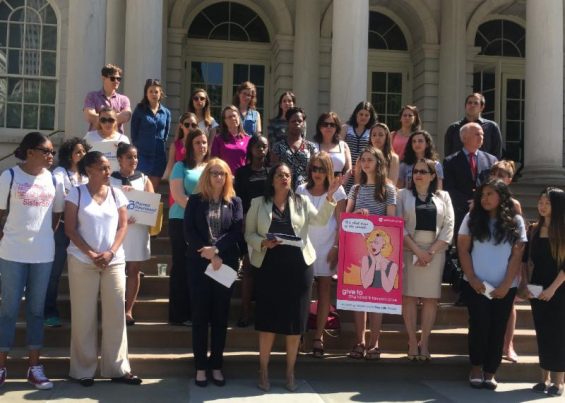
June 21, 2016 By Michael Florio
The City Council passed three bills today ensuring that women and girls have access to free pads and tampons in public schools, homeless shelters and correctional facilities.
The bills make New York City the first city in the nation to proactively guarantee access to menstrual hygiene products at such institutions, according to Councilwoman Julissa Ferreras-Copeland.
Ferreras-Copeland, along with Council Speaker Melissa Mark-Viverito, sponsored the three bills that require the Department of Education, Department of Citywide Administrative Services and Department of Correction to provide such sanitary products in public schools, shelters and city jails, respectively.
“Menstrual hygiene products are as necessary as toilet paper and should be treated as basic bathroom supplies,” Ferreras-Copeland said. “They allow women and girls, whether in school or in the board room, to participate fully in their daily activities and avoid health risks.”
One of the bills requires the DOE to provide menstrual hygiene products in 800 New York City public schools that serve grades 6 through 12 for free in school bathrooms. The bill affects approximately 300,000 students at an estimated cost of $3.7 million in Fiscal Year 2017, according to Ferreras-Copeland.
The first free tampon dispenser was installed at the High School for Arts and Business (105-25 Horace Harding Expressway North) in September.
Following the successful installation at that school, free tampon dispensers were installed in 25 public schools scattered throughout Queens and the Bronx in March.
Later that month, Ferreras-Copeland and Mark-Viverito sponsored the bills to bring these products to all schools, as well as shelters and jails.
Prior to this legislation, the DOC provided 144 sanitary pads per 50 inmates per week – or less than three per inmate – Ferreras-Copeland’s office said in March. Additional brand-name pads had to be purchased by inmates through the commissary. Now, the DOC must provide all female inmates with sufficient pads and tampons immediately upon request.
“Providing menstrual hygiene products privately, immediately and for free is also about sending a body-positive message by not perpetuating shame and humiliation, and acknowledging that women’s bodies, even those of women serving time in prison, deserve some dignity during their periods,” Ferreras-Copeland said.
The third bill requires the Department of Citywide Administrative Services to provide feminine hygiene products to 23,000 current residents in Department of Homeless Services family shelters and single adult women shelters, Department of Youth and Community Development shelters and Human Resources Administration domestic violence shelters. An estimated 2 million tampons and 3.5 million sanitary napkins will be supplied at a cost of $540,000 per year.
Ferreras-Copeland held a rally this morning at City Hall to celebrate the bill being passed.
3 Comments







@angela Your low wage job doesn’t pay for much..
It’s about time. Hey lower case Angela stop whining…It cost money to run a society and to get people to practice good hygiene. You buy into that low information Fox News delivered myth that society should run on fumes. you’re an imbecile.
as usual the taxpayers will be paying for this